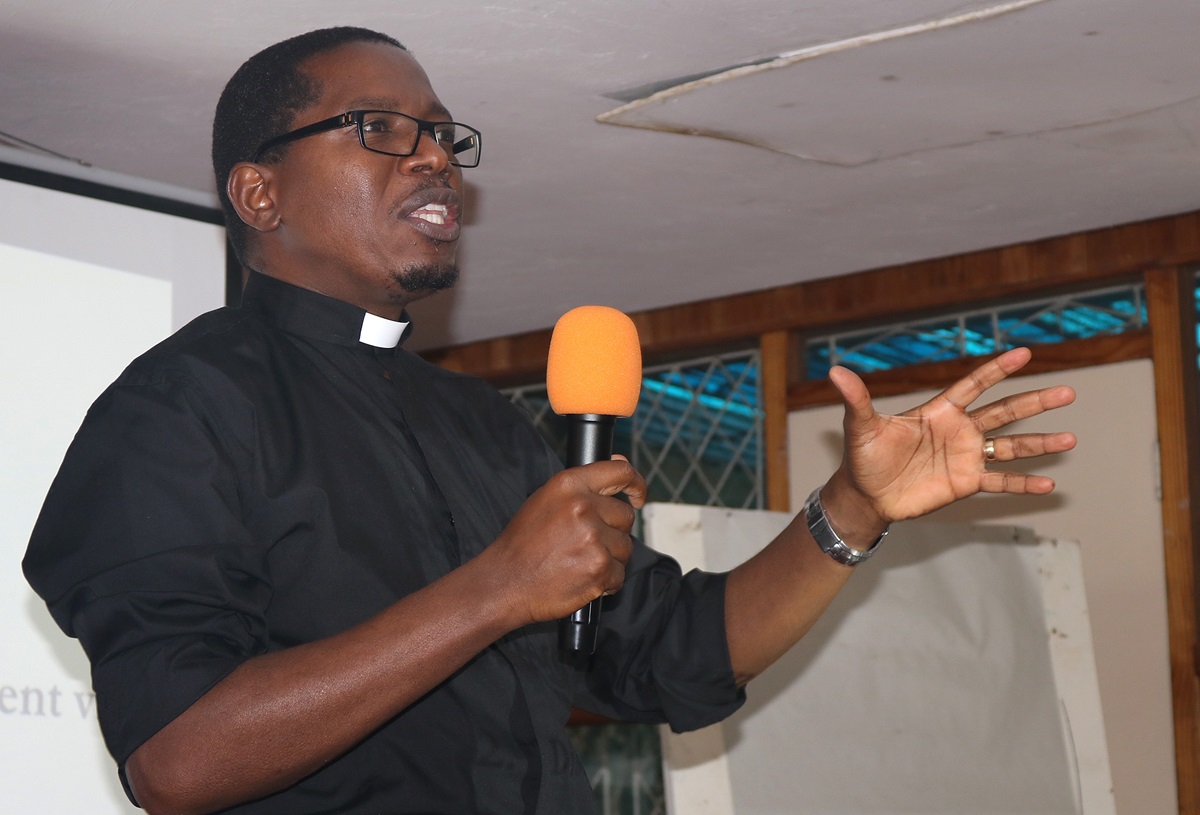“Build sustainable peace,” implored the Rev. Kenneth Mtata, the general secretary of the Zimbabwe Council of Churches. “We must never allow chaotic situations to prevail because all sources of evil thrive where there is chaos.”
Mtata was speaking to local ecumenical fellowship leaders, including United Methodists, drawn from the 10 provinces of the country who attended a two-day workshop at Kentucky Hotel in Harare.
Zimbabwe was engulfed in a three-day shutdown called upon by the labor unions as a response to fuel price hikes. Clashes between protesters and Zimbabwe security forces left 12 people dead and hundreds injured.
Mtata, in his opening address, called on the churches to “see, judge and act” around the events that have torn apart the nation.
Church leaders at the meeting issued a 10-point statement rejecting all forms of violence. They called on the state to restore the rule of law and constitutionalism and to revisit the country’s economic policy trajectory.
The statement also urged respect of citizens’ rights and freedoms, while discouraging the use of violence, looting and destruction of property.
“My heart is still shaken at the sight of violence that rocked my area. ... My mother, sister and 4-year-old nephew were beaten when soldiers broke into our house,” said Patience Sakabuya, 27, pastor of United Congregational Church of Zimbabwe in Mabvuku, Harare.
“I saw the masked military personnel going into Mabvuku Primary School on the first day of the protests. Young kids screamed at the sight of the soldiers as they roamed their school,” she added.

The Rev. Samuel Sifelani, pastor of St. Mary’s Highlands parish, said, “The kind of violence we saw in our nation is shocking as this is not in our DNA.”
The aftermath of the protests saw law enforcement picking up alleged perpetrators, and hundreds of citizens facing court prosecution.
In order to deal with the present and the probability of future arrests or alleged abductions, Fadzai Traquino, a practicing lawyer with Women and Law in Southern Africa, noted the need for the church to be aware of legal provisions during protests for assisting members facing arrests.
“The church in the midst of disagreements must be defenders of the rights of citizens,” she said. “But we must do so from an informed point of view.”
Mtata noted the high level of extremism in the country. He spoke of videos on social media with children of school age laughing at a police officer being beaten, “and in some cases young children would be seen rolling and burning tires.”
“The utter disregard of human life has been passed on to the young generation. ... Now in Zimbabwe, violence knows no age,” Mtata said.
He said there are very dangerous indicators that are driving into an era where Zimbabwe could easily degenerate into a failed state, including a disregard for human life, discord within the armed forces and disrespect for people with different views.
As a way of responding to the “degenerate and fragmented” state of affairs, Mtata said engagement is the only alternative and way forward for Zimbabwe.
President Emerson Mnangagwa has extended an invitation to dialogue with the opposition political parties, civic society organizations and churches.
“In our engagements with the state, the following must be made clear; the image of God in each person must be valued, ordering of the security sector become a priority and emphasize that God has created the human race in its diverse form.”
Pastors at the workshop were both skeptical and optimistic of the success of such dialogue.
“The genuineness of this invitation has been received by some with suspicion, but as the church, we continue to insist that the only way out of the chaos in Zimbabwe is for the nation to engage,” Mtata said.
“In our communities such as the Chiredzi, we have seen leadership of the ruling party and opposition working together for the common good, but it appears this gets complicated at the national level,” said the Rev. Francis Mariki of The United Methodist Church.
Sifelani bemoaned the widening rift along political lines but said, “Throughout history of mankind, dialogue always worked out as the best route.”
The group’s 10-point statement also invited the state and people of Zimbabwe to a consensus-building dialogue to look for solutions and “formulate a binding national vision.”
The Zimbabwe Council of Churches has been involved in positive engagement and advocacy with the state from the 2018 pre- and post-election period through the #iprayivote campaign.
Maforo is communicator for the Zimbabwe Episcopal Area.
News media contact: Vicki Brown at (615) 742-5470 or newsdesk@umcom.org. To read more United Methodist news, subscribe to the free Daily or Weekly Digests.
Like what you're reading? Support the ministry of UM News! Your support ensures the latest denominational news, dynamic stories and informative articles will continue to connect our global community. Make a tax-deductible donation at ResourceUMC.org/GiveUMCom.




